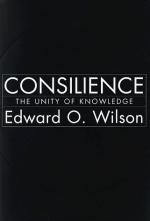
|
| Name: _________________________ | Period: ___________________ |
This test consists of 5 short answer questions, 10 short essay questions, and 1 (of 3) essay topics.
Short Answer Questions
1. What kind of progress does Wilson see in the history of life on earth?
2. What is the difference between primary and secondary emotions?
3. Why does Wilson take up the example of dreams?
4. What would need to be true before we could establish the goals and progress of evolutionary processes, in Wilson's account?
5. What subject would Wilson like to see more of in undergraduate education?
Short Essay Questions
1. How does science impact the arts, in E.O. Wilson's account?
2. How does Wilson offer ants as a metaphor for consilience?
3. How does Wilson use evolution as a parallel for consilience?
4. What does consilience provide as an educational policy?
5. How does consilience aim to resolve political problems?
6. What does the term "consilience" mean?
7. How does Wilson describe the mindset necessary to be a scientist?
8. What is the modern understanding of dreams?
9. How does Wilson describe what it is possible to know about the brain?
10. How would you describe Francis Bacon's influence on Wilson's idea of consilience?
Essay Topics
Write an essay for ONE of the following topics:
Essay Topic 1
Where does the sense of proof reside in the body, or in experience? That is, how can a person tell the difference between a rational proof and a faulty proof, a faith-based proof or an irrational proof? If proof can be a final and complete experience, how does it distinguish between its sources? If proof is a temporary feeling that has to be reasserted--if it is a story that has to be retold again and again to be 'believed'--how does it account for the rest of experience, which tends to be chaotic and inscrutable, rather than clear and linear and rational?
Essay Topic 2
What are the reasons that the sciences have resisted the urge to unification expressed in consilience? How are the sciences organized like trades, and how have individuals staked claims on funding or authority that would prevent consilience?
Essay Topic 3
How does the knowledge that EO Wilson lost sight in one eye in childhood and lost a substantial degree of his sense of hearing in adolescence affect his idea of consilience? How would you relate the physical challenges with the intellectual rigor of the scientist, and the vision of the social theorist?
|
This section contains 938 words (approx. 4 pages at 300 words per page) |

|




